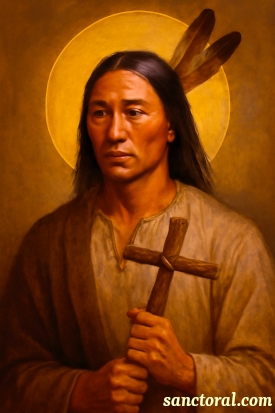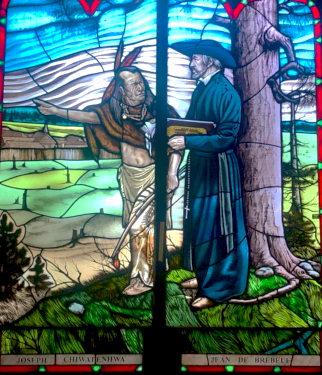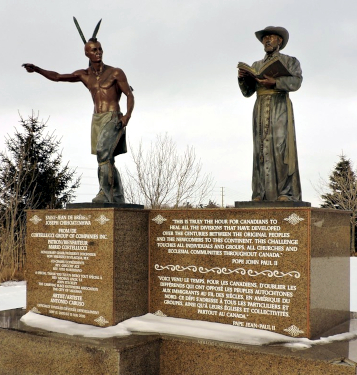Lives of the Saints
Our Models and Protectors
Spiritual Bouquet:
August 2

Blessed
Joseph Chiwatenhwa
Huron Martyr
(† 1640)
Born in the early seventeenth century, Joseph Chiwatenhwa lived at Ossossané, where he participated in the fur trade. Not very rich in earthly goods but gifted with rare qualities, nephew of a great Huron chief, the Blessed enjoyed the esteem of his compatriots and had a voice in their advice.
Even before his conversion, his way of life stood out from that of his people. His customs were sober: gambling, smoking and diabolical feasting were foreign to him. When he was very young, he married a girl from his nation, named Aonette. He understood and always respected marital fidelity, which was almost unknown among the Hurons. In short, docile to the natural law inscribed by God in the hearts of all men, Chiwatenhwa already lived in an exemplary manner.

Bl. Joseph Chiwatenhwa and St. John de Brébeuf
The arrival in Ossossané of the Jesuit missionaries - and particularly of St. John de Brebeuf - changed his life forever. He adhered early to their teachings. His greatest desire was to receive holy baptism, a grace that was granted to him on August 16, 1637, as he lay on a bed of pain, suspended between life and death. Prayers to the great St. Joseph, whose name he had received at baptism, restored him to strength and health. Since it has pleased God to restore me to health," said the new Christian, "I am resolved to be very faithful to Him all my life. I will make sure that others know Him." Until death, this will be the watchword of our Blessed: he will be the apostle of the Hurons.
Apostle first of all in his own family. On March 19, 1638, his wife Aonette was baptized in turn, as well as several nephews and nieces. That same day, Father de Brebeuf blessed the union of Joseph and Marie Aonette, thus celebrating the first Christian marriage in Huronia. Joseph Chiwatenhwa did not allow his people to offend God; he had at heart to teach well those whom God had entrusted to him directly. His family was an edifying spectacle of a truly Christian life.
He was then an apostle in his village and in all Huronia. Animated, according to one Father, by a spirit similar to that of the Apostles when they left the Cenacle, Chiwatenhwa spoke of God on all occasions, and with a strength that could only come from Above. His examples gave solid support to his words. He publicly professed his faith, refused to attend pagan ceremonies, to use magicians, etc. Joseph Chiwatenhwa's courageous piety and his family's persistent devotion under very difficult circumstances was a good answer to the Huron who claimed that a native could not attain the level of morality required by Christianity.

Bl. Joseph Chiwatenhwa and St. John de Brébeuf
Overflowing with gratitude for the missionaries who had taught him the true faith, Joseph helped them with all his strength in their apostolic work. He accompanied them on their errands, defended them in hostile councils, prepared the hearts of his countrymen to receive their teachings. In doing so, he exposed himself to a very real danger, for the Jesuits were already being accused of witchcraft and held responsible for the epidemics which, by 1640, had reduced the Huron population by half. Joseph's faith did not waver when several members of his family died or fell ill, nor when his sister-in-law succumbed to illness and died within 48 hours of her baptism.
The Spiritual Exercises of St. Ignatius followed with fervor (January 1640) set the Blessed back on the narrow path of perfection. His soul was purified in the midst of great trials. On August 2, 1640, he was ripe for Heaven. On that day, Joseph Chiwatenhwa was working alone in his vegetable garden when he was treacherously put to death by two Native Americans. The murder was blamed on the Iroquois; however, there are grave reasons to believe that the Blessed was killed by his own people in hatred of the faith.
The oblation of the generous martyr soon bore abundant fruit. After his death, conversions multiplied, beginning with that of his own brother - also baptized Joseph - whom he had tried in vain to win to God during his lifetime.
Prayer of Blessed Joseph Chiwatenhwa
Lord God, at last I know You. Thank God! Now I know You. You made the earth we live in, the sky above us; You made us, who are called men. As we are the masters of the canoes we made and the houses we built, so You are our Master, You who created us. It is not much, however, that we be the masters of all we have: we are the masters of our canoe and of our house only for a short time. But You are the Master of us men forever.
As long as we live, how can we doubt that You are the Master? And when we die, You are still the Master. You alone have made all things; You are therefore perfectly the Master. There is none other with You. It is You above all that we should fear, You above all that we should love, because You are the Almighty, because You are the one who truly loves us to the utmost. As for men and demons, neither of them are mighty. No, no, the demons are not mighty; moreover, they do not love us.
That is why, today, I give thanks to You in a special way for having wanted me to know You. You love us to the extreme: now, at last, I consecrate to You my person who stands before You; now, at last, I acknowledge You as my Master. You are my only Master. Simply command. No matter if I suffer, I will simply think: it is as my absolute Master wills it...
We are all Your creatures. As for me, I am nothing at all. I do not want to worry about what might happen in our family. I will simply think: God, whose creatures we are and who loves us, will see to it. If it is His intention that our family becomes poor, I will consider: this is the Will of God who loves us. If He intends our family to be rich, I will consider: I know not what God intends. I will be all the more fearful, and I will be careful as to the way I live. It is easy for the rich to be sinners, for without them noticing it, the devil accompanies them at once. Alas, it is in vain that some men boast over their wealth. No, certainly, the rich are no greater than the poor. You love us equally, rich and poor alike.
Oh, how happy I am to finally know Your designs, O God who loves us. I give thanks to You, and to You I abandon my person who stands before You. Behold, I am distancing myself from all that we value while we are alive; I give it no more attention: You alone, uniquely, dispose of me as my Master.
It would have been enormous if You had simply wanted men to exist. We ought to already have given thanks to You for that, because You have left us many things on earth which we enjoy. But You did more than that. You wanted men, when they die, to go to Heaven where they will live forever. I do not want to imagine what Heaven really is. I would be presuming upon myself if I searched for what it is, for I am nothing. It must suffice for me to know it is Your will [for us to go to Heaven].
At long last, I really and truly believe. There is nothing at all that I doubt in the least, for You are no liar. You always speak the truth, whatever You say. It suffices for me that You said, “I will deny you nothing in Heaven.” I believe You, because nothing is difficult for You. Moreover, You love us. Your word is the reason for my hope. Is it not true, then, that we should no longer make any objection to suffering during our life? This is what will happen: the more we suffer, the more we will benefit from it in Heaven. Moreover, when we suffer, we are less attached to our life.
Ah, truly, death is no longer something to be feared! It is for fear of losing a bit of nothingness – the earth – that we are afraid to die. Truly, we are not intelligent, for in Heaven we will be happy.
During our life on earth, we are like those who go trading. Those who leave to go and trade suffer continually. I will let you imagine how we rejoice when we are on our way home. We only think: now we are almost home, now we are at the end of our sufferings! It should be the same when we are about to die. We should think: I am at the end of my troubles! Lord God, this is my sentiment. At last I no longer fear death. I will rejoice when I am about to die. [Nor] do I want to grieve or be sad about the death of my loved ones. I will simply think: God has disposed of them; it is His plan that they go to Paradise, so let them go. And I will think: God loves them greatly, since it is His Will that they depart and be perfectly happy.
O.D.M., Source: Relations des Jésuites, Montréal, Éditions du Jour, 1972, volume II: «Years 1637-1641».